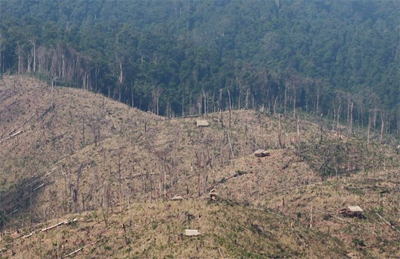Inclusion of forest conservation in a market-based mechanism for reducing greenhouse gas emissions would crash carbon prices by swamping the market with cheap credits, claims a new report from Greenpeace.
The environmental group said low carbon prices would “derail global efforts to tackle global warming” and cause “developing countries losing out on billions of dollars a year for investment in clean energy technologies”.
“If these countries don’t get incentives for a switch to low-carbon technologies, through carbon markets and funds, emissions will continue to rise,” it said.

Deforestation in Laos |
Greenpeace fears a market-based REDD mechanism (Reducing Emissions from Deforestation and Degradation) would allow industry to continue spewing emissions offset by avoided deforestation carbon credits. The concern is not new — it played a critical part in the exclusion of forest conservation in the Kyoto Protocol. Failure to include forestry from Kyoto effectively removed financial incentives for countries to preserve their forests. Since then more than 100 million hectares (250 million acres) of tropical forests have been leveled.
WWF, a group that actively opposed including forest carbon under Kyoto on the grounds that it would undermine the carbon market and give polluters an easy way to avoid reducing industrial emissions, changed its position on REDD last year.
“The Amazon, if it were a country, would be in the top seven emitters of greenhouse gases in the world,” WWF president and CEO Carter Roberts said at the Avoided Deforestation Partners meeting in New York last September. “Unless the world has policies that recognize that value of standing trees and forests, we will have failed.”
“In Kyoto, WWF was pivotal in keeping forests out. We have changed our position.”
Greenpeace’s proposal
Greenpeace is marketing its own “Forests for Climate” initiative become part of the second phase of the Kyoto (post-2012) agreement on climate change. The next major round of climate talks will take place in Copenhagen in December 2009. Once an agreement is reached, carbon conservation funds will become available to developing countries, although projects are already proliferating across the tropics.
Roman Czebiniak, Greenpeace International political advisor on forests, says an unrestricted carbon market is a “dangerous dangerous option that won’t save the forests or stop runaway climate change.”
 Deforestation from gold mining in Peru. |
“Of the many options for forest financing currently on the table, this one ranks as the worst.”
Supporters of a market-based, but regulated, REDD mechanism say it could generate billions of dollars for forest conservation and sustainable development while helping mitigate climate change and preserving biodiversity. More than two dozen rainforest countries have signaled interest in participating in forest conservation schemes put forth by the U.N. and World Bank.
Greenpeace says the basis for its initiative would be “Tropical Deforestation Emission Reduction Units” (TDERUs), newly defined units that would be used for compliance with emission obligations agreed upon in future international climate treaties. Industrialized nations would be required to meet a certain percentage of their emissions obligations using TDERUs purchased from the mechanism. In effect, these countries would pay into a fund to reduce deforestation in tropical nations. The fund would aim to raise $10-15 billion per year — the amount estimated by the UK government’s Stern report on climate change to reduce tropical deforestation by half.
Greenpeace says that funds generated from a Tropical Deforestation Emission Reduction Mechanism (TDERM) would be used for “capacity-building efforts and for national-level reductions in deforestation emissions.” The group believes national-level reductions in emissions would help prevent “leakage” or the shifting of deforestation from one part of a country to another.
Greenpeace claims that Forests for Climate is “the only mechanism that involves local and indigenous forest peoples’ representatives to ensure their rights and livelihoods are respected.” Indigenous rights’ have been a key stumbling block in avoided deforestation discussions. Many forest peoples’ groups believe they are being left out of international negotiations that will affect their use of, and rights to, the forests they have depended upon for generations. Still, some indigenous groups — including tribes in the Amazon — have already lined up their own REDD projects.
Deforestation and forest degradation is the second largest source of greenhouse gas emissions from human activities, a larger source than all the world’s cars, trucks, planes, and ships combined.














